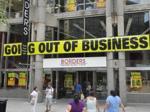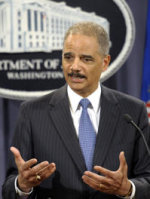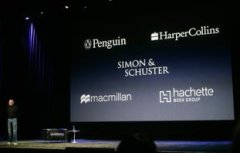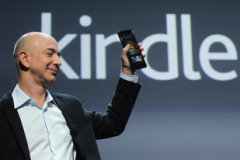
Just why are e-books so expensive, and should they be?
The knee-jerk answer to the second question is of course not. Does it make sense to pay a higher price for a digital title than for its print counterpart, especially after factoring in the cost of an e-book reader? (Tangential aside: Purchasing an e-book reader is believed to be a more environmentally sound choice than buying new books.)
So, while most government action these days draws criticisms of busybody interference, the Department of Justice’s price-fixing charges filed April 11 against Apple and “five of the six largest publishers in the United States” brought a sense of satisfaction for anyone who has seethed while downloading a pricier title.
Three publishers—HarperCollins, Hachette Book Group, and Simon & Schuster—settled to avoid the expense of a civil trial. But Apple and two others, Macmillan and Penguin USA, are fighting back. The two publishers believe that a monopoly would return to the marketplace. Apple thinks the government’s case is weak (the Wall Street Journal and the Yahoo! Daily Ticker agree) and will ask for a trial in a June 22 hearing.
 Borders going out of business
Borders going out of businessDespite arguments that publishers have been technologically out of touch, the defense claims that the agency model actually led to a more robust e-book marketplace. And one best-selling author claims that the Apple deal actually staved off the death of brick-and-mortar bookstores. (Turns out paper and print costs make up only 10 to 15 percent of a book price.)
Whom to believe? What’s the agency model? How much is a book going to be? Read on.
Forget the merits of the case. When are prices dropping? Summer book reading may actually get a little cheaper. CNN has a spellbinding list of things Amazon could do, like $1.99 fire sales, giveaways, or bundles. Non-Amazon e-book retailers could pump up their loyalty programs to compete.
Even iBookstore patrons could benefit in the short term. While its armies of gray suits do battle in the courtroom, Apple could either drop all the publishers that agree to the agency pricing (see explanation below) and lose a chunk of its offerings, or it could negotiate with all publishers now. Who knows, maybe “The Hunger Games” could get a place in the iBookstore.
[Related: eBooks invented in 1971]
 Attorney General Eric Holder at press conference
Attorney General Eric Holder at press conferenceHow a book is priced, Uncle Sam’s tale: Now for the merits of the case. According to the DOJ antitrust complaint, publishers usually sell a title to retailers for about half the list price. Retailers can then sell the book at any price. That’s the wholesale model.
When Amazon launched Kindle in 2007 and priced all books at $9.99, competitors rushed to match or beat the price. Publishers, the DOJ said, feared that “Amazon and other retailers would demand that publishers lower their wholesale prices, again compressing their profit margins.”
Apple’s iBookstore entry took on the agency model, which lets publishers set the e-book price, and gave Apple a 30% commission as the selling agent. Publishers sell directly to readers rather than through a retailer.
All these publishers scheming (and doing so “in private dining rooms of upscale Manhattan restaurants“) resulted in higher prices, the government claimed, and cost readers more than $100 million. Another clause that tickled DOJ antitrust antennas: the Most Favored Nation (MFN), common in all agency contracts, in which a publisher guarantees that no other retailer could set prices below what was set for Apple.
On many adult trade e-books, consumers have witnessed an increase in retail prices between 30 and 50 percent. In some cases, the agency model dictates that the price of an e-book is higher than its corresponding trade paperback edition, despite the significant savings in printing and distributing costs offered by e-books. (Case 1:12-cv-02826-UA, Competitive Impact Statement)
As for Apple, the Wall Street Journal says the agency model “has been upheld by federal courts and is common across many industries.” The lawsuit claims it’s targeting the collusion, not the business model.
Incidentally, Random House wasn’t sued. One Los Angeles Times opinion piece says that’s because Random House didn’t participate in the dinners. Note to potential conspirators: best to meet at a food court.
 Apple publisher partnership
Apple publisher partnershipHow the agency model fought the monopoly, the book publishers’ tale: HarperCollins, which said it settled because of a “business decision,” claimed that readers have “choices of devices, formats and prices that never would have existed but for the agency model.” The Hachette Book Group, also echoing denials, said it made “less money than before the adoption of agency“:
Two years ago, Amazon effectively had a monopoly on the sale of eBooks and eReaders, and was selling products below cost in an effort to exclude competitors. Today, consumers have multiple sources to choose from, and the price of dedicated e-readers has fallen dramatically. And the fact that 82% of Hachette’s eBooks are currently priced at $9.99 or less — including many books by our bestselling authors — belies any notion that we increased prices on all eBooks. (HBG’s statement on the US Dept of Justice Case)
Macmillan, which had a tiff once with Amazon that resulted in its books being pulled off the retailer’s site, stated it would fight:
[T]he terms the DOJ demanded were too onerous. After careful consideration, we came to the conclusion that the terms could have allowed Amazon to recover the monopoly position it had been building before our switch to the agency model. We also felt the settlement the DOJ wanted to impose would have a very negative and long term impact on those who sell books for a living, from the largest chain stores to the smallest independents. (April 11, Macmillan)
As for Penguin:
The decision we took in January 2010 to move Penguin’s e-book business to agency pricing has been vindicated by the very rapid subsequent growth in the volume of e-books sold by agency publishers, and by the benefit to consumers of the steep decline in the price of e-book readers that that has resulted from this open competition. (April 11, Penguin)
CNET has agreed and says that Amazon’s bargain pricing “was helping devalue consumers’ notion of what a new book ‘should’ cost.” Plus, publishers were giving a shot to retailers who couldn’t compete with Amazon. The Wall Street Journal says the lawsuit has caused investors to jump ship from Barnes & Noble.
 042412 e-books Jeff Bezos
042412 e-books Jeff BezosHappy Amazon, unhappy agents and authors, their story: Amazon, which used to be the biggest retailer, is calling the move “a big win for Kindle owners.” The suit, however, has upset writers, as well as the literary agents who represent them.
What this lawsuit probably will do instead is return to Amazon the power to monopolize the e-book market through predatory pricing to the detriment of publishers, authors and, ultimately, readers. (April 16, Op-Ed, Los Angeles Times)
Author Scott Turow wrote a cautionary letter well in advance of the civil case:
Amazon was using e-book discounting to destroy bookselling, making it uneconomic for physical bookstores to keep their doors open …
Just before Amazon introduced the Kindle, it convinced major publishers to break old practices and release books in digital form at the same time they released them as hardcovers. Then Amazon dropped its bombshell: as it announced the launch of the Kindle, publishers learned that Amazon would be selling countless frontlist e-books at a loss. This was a game-changer, and not in a good way. Amazon’s predatory pricing would shield it from e-book competitors that lacked Amazon’s deep pockets.. By the end of 2009, Amazon held an estimated 90% of the rapidly growing e-book market.
The irony bites hard: our government may be on the verge of killing real competition in order to save the appearance of competition. (March 9, The Author’s Guild)
Big corporations, indie booksellers—finding the best way to get a book out there: As mentioned before, print costs make up only a small fraction of a book’s price: CNET notes that “[a]uthor advances, design, marketing, publicity, office space, and staff” account for the overhead. One author laid out a “publishing pipeline” to prove that publishers are irrelevant and to advocate the J.K. Rowling “Pottermore model” of direct author-device-reader relationship.
True, publishers also provide marketing (although precious little, for most books) and the imprimatur of quality (you’ve read some bad published books, but you have no idea how much better they were than most of what festers on publishers’ slush piles.) But is there any reason other than history and momentum that editing, copyediting, design, typesetting, marketing, and quality assurance live under one corporate roof? Small presses already do an excellent job of all of these things, frequently by outsourcing them. So what’s so necessary about the Big Six, in an era of shrinking advances, when their biggest names can and will pull a Pottermore and start to sell books themselves? Very little indeed. (April 21, TechCrunch)
Some still advocate for the one-stop shop, but publishers could cut one expense: Cut down on digital rights management requirements. If the agency model presided, indie booksellers could charge a lower commission and publishers could keep their margins.
DRM is supposed to prevent piracy and illegal file sharing. In order to provide DRM, you need at least $10,000 up front to cover software, server, and administration fees, plus ongoing expenses associated with the software. In other words, much bigger operating expenses than a small business can afford. By requiring retailers to encrypt e-books with DRM, big publishers are essentially banning indie retailers from the online marketplace. (April 6, Paid Content)
Time for an ironic aside?: On July 27, the question of whether federal settlements are in the “public interest” will be addressed at a hearing. In a nice twist, the government litigator collecting public comment on the case is John Read.
